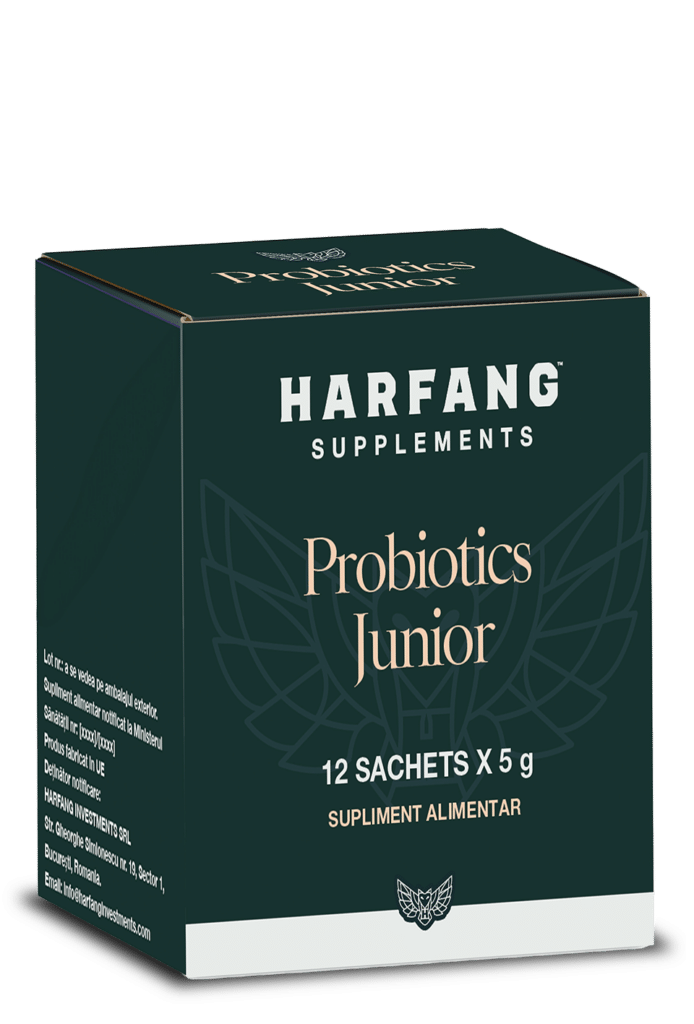All You Need To Know About Probiotics!
It might sound like a paradox: how can bacteria, often seen as the villains of health, actually be beneficial? We are talking about probiotics, the “good” bacteria that are making waves in the world of child health.
As a mom, you’re always on the lookout for ways to keep your child healthy and happy. You’ve probably heard a lot about probiotics lately and wondered if they’re just a passing trend or something that could genuinely benefit your little one. But you might also find it ironic that these tiny microbes, usually associated with illness, are now celebrated as vital for maintaining your child’s well-being.
Let’s explore how probiotics can make a real difference in your child’s daily life.

What Are Probiotics?
Probiotics are live microorganisms, often referred to as “good” or “friendly” bacteria, that offer a host of health benefits when consumed in adequate amounts. These beneficial bacteria play a crucial role in maintaining a balanced gut microbiome, which is essential for overall health and well-being.
There are various strains of probiotics, each with its unique benefits. The most common types include:
- Lactobacillus: Found in yogurt and other fermented foods, this strain helps with digestion and can ease symptoms of diarrhea.
- Bifidobacterium: Present in some dairy products, it supports the immune system and can improve symptoms of irritable bowel syndrome (IBS).
- Saccharomyces boulardii: A yeast-based probiotic that can help with digestive issues and restore gut flora balance after antibiotic use.
Natural Sources of Probiotics
Incorporating probiotics into your child’s diet can be as simple as adding certain foods that naturally contain these beneficial bacteria. Here are some excellent sources:
- Yogurt: Often the go-to source of probiotics, yogurt contains live cultures like Lactobacillus and Bifidobacterium. Opt for plain, unsweetened varieties to avoid excess sugar.
- Kefir: This fermented dairy product is rich in probiotics and has a tangy flavor. It contains a wider range of beneficial bacteria compared to yogurt.
- Sauerkraut: Fermented cabbage that provides a good dose of probiotics. Just be sure to choose unpasteurized versions, as pasteurization can kill off the live cultures.
How Do Probiotics Work?
Your child’s gut is home to many tiny living things like bacteria and yeasts. This group of tiny organisms is called the gut microbiome, and it’s very important for their health. It helps with digestion, supports their immune system, and keeps them healthy.
For example, when your child eats food, the microbiome helps break it down and absorb nutrients. It also helps their immune system fight off germs. If the balance of these microorganisms is disturbed, your child might experience tummy aches or get sick more easily. Keeping this balance helps ensure they stay healthy and feel good.
Role of Probiotics in Maintaining a Healthy Balance of Gut Bacteria
Probiotics help maintain a healthy balance of gut bacteria by increasing the population of beneficial microorganisms in the gut. They work by replenishing and supporting the growth of these “good” bacteria, which can be disrupted by factors like illness, antibiotic use, or poor diet.
Mechanisms of Action
- Competition with Harmful Bacteria: Probiotics work by competing with harmful bacteria for resources and attachment sites in the gut. By out-competing these pathogens, they help prevent their overgrowth and reduce the risk of infections and illnesses.
- Enhancing Gut Barrier Function: Probiotics help strengthen the gut lining, which acts as a barrier to prevent harmful substances and pathogens from entering the bloodstream. A healthy gut barrier is crucial for preventing conditions like leaky gut syndrome and promoting overall gut health.
- Modulating the Immune System: Probiotics can interact with immune cells in the gut, helping to regulate immune responses. They can boost the production of antibodies and other immune factors, enhancing the body’s ability to fight off infections and maintain a balanced immune system.
Benefits of Probiotics for Children

Improved Digestion and Reduced Constipation
Probiotics help break down food more efficiently and support regular bowel movements. For children struggling with constipation, probiotics can be particularly beneficial. They enhance the balance of gut bacteria, which helps improve stool consistency and frequency, making it easier for your child to have regular, comfortable bowel movements.
Enhanced Immune Function
Probiotics contribute to a stronger immune response by interacting with gut-associated lymphoid tissue (GALT), a crucial part of the immune system located in the gut. By supporting the production of immune cells and antibodies, probiotics help your child fend off infections.
Potential Reduction in Allergies and Eczema
Emerging research suggests that probiotics may help reduce the risk of developing allergies and eczema in children. Probiotics promote a balanced gut microbiome, which may influence immune system development and reduce inflammatory responses linked to allergic conditions. This can be particularly valuable for children with a family history of allergies or eczema.
Support in Preventing and Managing Diarrhea
Probiotics are well-known for their role in managing and preventing various types of diarrhea. They are effective in:
- Antibiotic-Associated Diarrhea: Antibiotics can disrupt the natural balance of gut bacteria, leading to diarrhea. Probiotics help restore this balance.
- Infectious Diarrhea: Probiotics can also help prevent and manage diarrhea caused by infections, such as rotavirus. They work by promoting a healthy gut environment and supporting the body’s natural defenses against pathogens.
Do Kids Really Need a Probiotic?
When thinking about whether your child needs a probiotic, it’s helpful to consider a few key factors:
- Diet: If your child isn’t getting much in the way of yogurt, kefir, or other fermented foods, they might miss out on some natural probiotics. If their diet is lacking in these, a probiotic supplement could be a good idea.
- Health Conditions: Kids with specific health conditions like irritable bowel syndrome (IBS) or inflammatory bowel disease (IBD) might find probiotics beneficial. These supplements can help manage symptoms and support a healthier gut.
- Antibiotic Use: Antibiotics are great for treating infections, but they can also disrupt the balance of good bacteria in the gut, sometimes leading to digestive problems. If your child has been on antibiotics, probiotics can help restore that balance and ease any related tummy troubles.
- Weakened Immune System: For children who catch colds or other bugs frequently, probiotics can give their immune system a boost. By supporting a healthy gut, they help your child stay resilient and better able to fend off infections.
Choosing the Best Probiotic Supplements for Kids

When selecting a probiotic supplement for your child, it’s essential to choose one that meets their specific needs. Here are some key factors to consider:
Key Strains to Look For
Different probiotic strains offer different benefits. When picking a supplement, look for these well-researched strains:
- Lactobacillus: This strain is known for its role in maintaining a healthy balance of gut bacteria and supporting digestion.
- Bifidobacterium: It helps support the immune system and can be beneficial for managing digestive issues like constipation.
CFU Count and Diversity
CFU, or Colony Forming Units, indicate the number of live bacteria in each dose. For effectiveness, choose a supplement with a CFU count that aligns with your child’s needs, typically ranging from 1 billion to 10 billion CFUs per serving. Additionally, diversity in probiotic strains can enhance the supplement’s benefits by offering a broader range of positive effects on gut health.
Forms of Supplements
- Chewables: These are often a hit with kids for their taste and ease of use.
- Powders: Easy to mix into drinks or foods, powders such as Harfang Probiotics Junior sachets are a flexible option.
- Liquids: Convenient for younger children who might not be able to chew tablets or mix powders.
Reading Labels and Ensuring Product Quality
Always check the label to ensure that the probiotic supplement contains the specific strains and CFU count advertised. It’s also important to verify that the product is free from unnecessary additives and allergens. Choosing high-quality products from reputable brands ensures that you’re providing your child with effective and safe probiotics.
Harfang Probiotics Junior.

This product is formulated with key strains like Lactobacillus and comes in a kid-friendly form, making it easy to incorporate into your child’s daily routine. Harfang Probiotics Junior is designed to support digestive health and overall well-being, plus, it’s safe and free from any additives or allergens, ensuring it’s gentle on your child’s system, providing a reliable choice for parents who want the best for their children.
In Summary
Probiotics can be a valuable addition to your child’s health regimen, supporting everything from digestion to immune function. By understanding what probiotics are, how they work, and their benefits, you can make an informed decision about incorporating them into your child’s diet. Considering factors like key strains, CFU count, supplement forms, and product quality ensures you choose the best probiotic for your little one’s needs.
For parents looking for a reliable, high-quality probiotic supplement, Harfang Probiotics Junior stands out. Formulated with essential strains and free from additives and allergens, it’s a safe and effective choice to support your child’s overall well-being.
To explore more about probiotics and other health supplements, visit the Harfang Supplements website, one of the best online supplement stores in Canada. Give your child the best start on their journey to a healthy, balanced gut.


